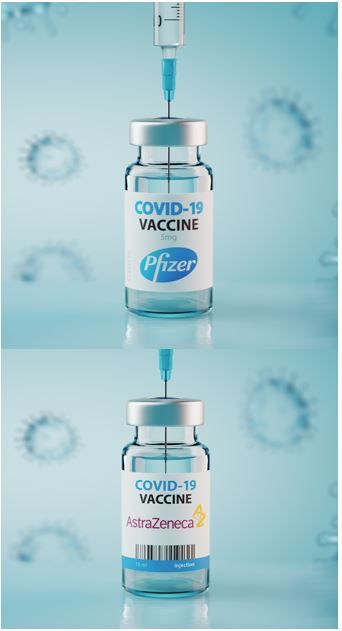- Clinical Technology
- Adult Immunization
- Hepatology
- Pediatric Immunization
- Screening
- Psychiatry
- Allergy
- Women's Health
- Cardiology
- Pediatrics
- Dermatology
- Endocrinology
- Pain Management
- Gastroenterology
- Infectious Disease
- Obesity Medicine
- Rheumatology
- Nephrology
- Neurology
- Pulmonology
Pfizer, Oxford-AstraZeneca Vaccines to be Studied in Alternating Doses
Oxford researchers will evaluate the interchangeability of the vaccines, the impact of different dosing intervals, and the potential for enhanced immune response.
Researchers in Britain have initiated a study to determine whether using different COVID-19 vaccines, ie, from different manufacturers, for the prime and follow-up booster shots might be a viable route to maximizing vaccination coverage.
The scientists, from the Oxford Vaccine Group, are also evaluating whether this "mix and match" strategy might broaden the scope of vaccine protection against emerging virus strains, according to a press release issued by the group.
©Feydzhet Shabanov/stock.adobe.com

"If we do show that these vaccines can be used interchangeably in the same schedule this will greatly increase the flexibility of vaccine delivery, and could provide clues as to how to increase the breadth of protection against new virus strains," said Matthew Snape, the trial's chief investigator and associate professor in Paediatrics and Vaccinology at the University of Oxford, in the Group's press release.
The UK-government funded study, referred to as the COVID-19 Heterologous Prime Boost, or ‘Com-Cov’ study, will recruit more than 800 volunteers who have not been previously vaccinated against COVID-19 and are aged ≥50 years from 8 National Institute for Health Research supported sites in England. Four different combinations of prime and booster vaccinations will be administered:
- A first dose of the Oxford-AstraZeneca vaccine followed by a Pfizer vaccine booster or a second dose of the Oxford-AstraZeneca vaccine;
- Or, a prime dose of the Pfizer vaccine followed by boosting with either the Oxford-AstraZeneca vaccine or a further dose of the Pfizer vaccine.
Two different dosing schedules will be evaluated: at a 4-week interval for an early interim data review and at a 12-week interval for comparison to current UK policy.
The trial is set to run for 13 months.
Cultivating flexibility
Development of a more "flexible" immunization program would help meet the many challenges inherent in a global public health strategy including the sheer number of individuals requiring vaccination and the threat of supply constraints, points emphasized by Professor Jonathan Van-Tam, deputy chief medical officer and senior responsible officer for the study in a news release from the Oxford Vaccines Group.
"It is also even possible that by combining vaccines, the immune response could be enhanced giving even higher antibody levels that last longer; unless this is evaluated in a clinical trial we just won’t know," said Van-Tam in the Oxford statement.
"This study will give us greater insight into how we can use vaccines to stay on top of this nasty disease."
The Pfizer vaccine, codeveloped with BioNTech, was granted emergency use authorization in the UK on December 2, 2020 and by the US Food and Drug Administration on December 11, 2020. The vaccine is in wide distribution in the US, UK, and Europe. The Oxford-AstraZeneca vaccine was approved for emergency supply in the UK in late December 2020 and was recently reported to have 82% efficacy at preventing COVID-19 infection and also to show promise for reducing asymptomatic transmission.
